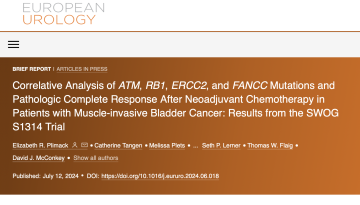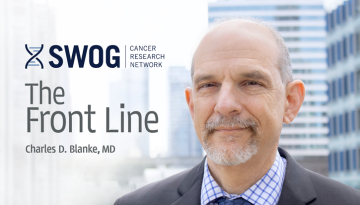A Sneak Peek at Spring in Seattle
SWOG's spring group meeting is imminent. We'll meet in Seattle April 3 – 6, at the Hyatt Regency Seattle, with online access also available for most open sessions.
As with last fall’s group meeting, you can install our meeting app on your smart phone (Android or Apple), or you can simply use the online version in a browser (no installation needed).
Our twice-a-year group meetings are vital to our success as a research network – with 20,000+ members at more than 1,300 sites, devoting a few days to working face-to-face to plan and report on progress is absolutely invaluable.
While efficient networking is critical, the hybrid approach we adopted as we emerged from the pandemic was extremely helpful in allowing members who had travel-related safety concerns (for themselves, their patients, or both) to continue contributing to our essential work.
But fully supporting access in two parallel formats – in-person and virtual – is dramatically more costly than holding just a face-to-face meeting. So, we’ve taken a number of steps to significantly reduce costs – particularly those related to technology. While most of the open sessions at this spring meeting will still be accessible virtually, we have ended our formal virtual components presentations for most closed, invitation-only meetings.
Leaders of those closed sessions, though, don’t lack options – we encourage them to set up and host their own virtual meetings. We have wireless internet and projector-connected laptops (or you can use your own) on which you can launch a Zoom or WebEx call. Audio out from laptops feeds into the room’s sound system.
If you do want to set up your own virtual session, please keep these points in mind:
- the A/V tech is responsible for the in-room experience only
- the laptop audio can be fed into the room’s sound system, but voices in the room will have to be picked up by the laptop’s mic –additional microphones are not available
- this means the presenter at the laptop should repeat audience questions so your virtual attendees can hear them
We will still record the virtual feeds from our open sessions (only) and will make recordings available to logged-in members. You’ll be able to download video files directly rather than viewing them as YouTube posts.
We’ve found substantial savings in the food and beverages category, but you won’t experience big losses. The only out-and-out cut (i.e., we had it last time but won’t this time) is that on Thursday and Friday afternoons we will no longer provide coffee (which comes at a per-gallon cost about 50 times that of gasoline!).
All in all, with these and other savings, we have reduced group meeting costs this spring by more than $200K compared to last fall’s meeting. Not chump change, and required in this time when we expect a substantial budget cut.
But enough focus on savings. Let’s move on to the good stuff – some of the highlights to look forward to in Seattle.
- Our general plenary (Plenary II) on Friday highlights SWOG progress and plans in breast, palliative care, and lymphoma research, and gives me a chance to bring you up-to-date on news and developments in your cooperative group (and maybe tell an amusing story).
- Our translational medicine (TM) plenary (Plenary I), in addition to featuring talks on using -omics to characterize the tumor microenvironment and on TM research in breast cancer, includes a mini-symposium on using NCTN’s Navigator to identify and request biospecimens for your TM research.
- Speaking of biospecimens, we’ve got presentations lined up at both the Clinical Trials Training Course and the Oishi Symposium about new resources we’ve developed to guide member sites in collecting and processing biospecimens and submitting them to the biobank.
- Our Take Action Symposium this spring highlights approaches to ensuring equity for LGBTQ+ patients in clinical trials and is paired with a Friday evening screening and discussion of the short film “Trans Dudes with Lady Cancer.”
- Thursday’s prevention and epidemiology committee session will feature the first-ever Meyskens Prevention Lecture (delivered by a well-known name at SWOG – Dr. Gary Goodman).
- We have two kickoff sessions for new trials:
- Phase II S2210, launched in the fall, tests neoadjuvant carboplatin for patients with high-risk prostate cancer who have a BRCA mutation
- Phase III S2408 will test lanreotide (a single dose!) to prevent post-operative pancreatic fistula (technically, this one’s a pre-launch session)
- Finally, our SWOG Clinical Trials Partnerships Update Forum on Wednesday will discuss the first CTP-run trial, a leukemia study with protocol now in production. The site selection process for the trial is about to get underway, and this forum is your chance to get the big picture.
I’ll close by reminding you that many sessions can earn you Continuing Medical Education (CME) credit (claimable through the meeting app).
I look forward to seeing you at the meeting!
___________________________________________________
Trial of the Week
S1933: A Pilot Study of Hypofractionated Radiotherapy Followed by Atezolizumab Consolidation in Stage II or III NSCLC in Patients with Borderline Performance Status
S1933 is a pilot study assessing safety, with a primary objective of evaluating the rate of Grade 3-5 treatment-related adverse events. The team is also assessing response rate, progression-free survival, and overall survival.
The trial is enrolling patients with non-small cell lung cancer – those with Stage III disease with a performance status of 2 and those with Stage II disease who are not candidates for standard-of-care surgical resection.
The treatment approach tested here builds on data indicating synergistic activity between radiotherapy and immune checkpoint inhibitors.
Patients are given 15 fractions of hypofractionated thoracic radiotherapy over three weeks and are assessed for disease progression two to five weeks later. If no progression is found, patients go on to receive atezolizumab consolidation immunotherapy for up to 12 months.
S1933 was activated in 2020 and has enrolled 35 of its planned 47 patients. The study has been opened at about 150 sites.
Raid Aljumaily, MD, is S1933 study chair, and the top-accruing institution on the trial is his home institution, Stephenson Cancer Center at University of Oklahoma Health Science Center.
Please keep S1933 in mind when you see these patients with Stage II or III NSCLC who are not candidates for surgery.
Learn more on the SWOG S1933 page or the CTSU S1933 page.
Other Recent Stories



